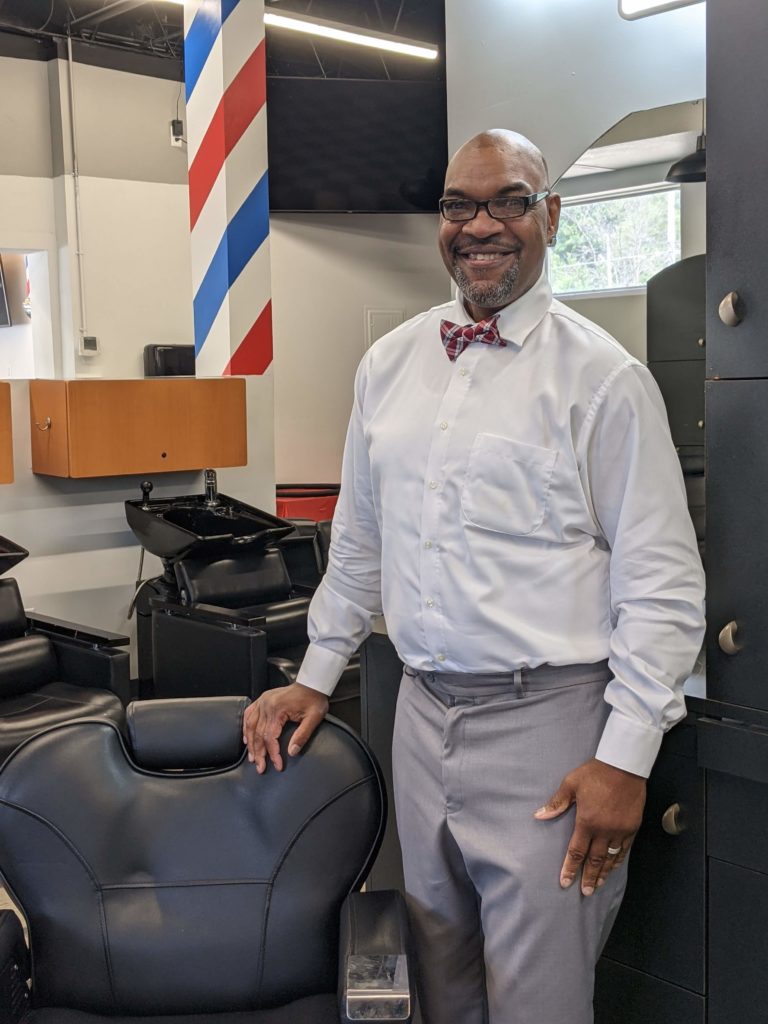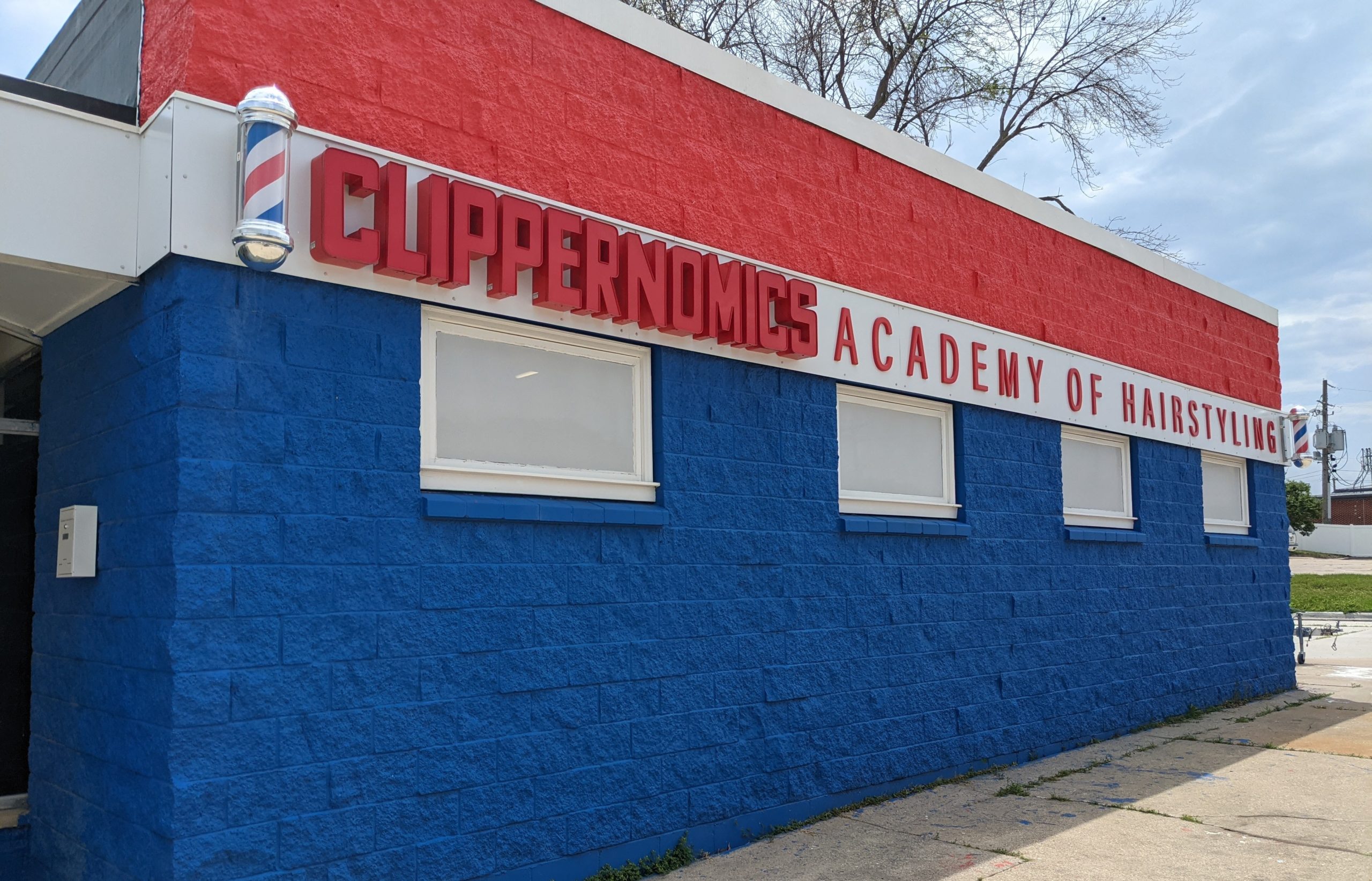Clippernomics starts classes after completing Drake Business Accelerator

Clippernomics Barber Shop and Beauty Salon owner Marc Nalls, who is better known as Tony Mac, opened a new barber college in Des Moines since the only other one in the city recently closed.
Before the first Clippernomics Academy of Hairstyling classes started earlier this month, he had purchased and renovated the building on Southwest Ninth Street and participated in the Drake Business Accelerator.
Tony Mac grew up with a barber shop in his Kansas City neighborhood and has decades of experience as a barber, including more than 20 years in the Des Moines metro area.
He said barber shops are like “think tanks,” bringing a community together for conversation, and with no pipeline in Des Moines for new barbers he “felt like someone had to take over the responsibility to teach the next generation.”
He had “harbored” the idea of opening a barber college since 2009 when he changed the salon’s name to Clippernomics and started planning how to build an identity for the business.
The effects of the pandemic about a decade later, however, meant unexpectedly closing his two salon locations in Urbandale and on Des Moines’ south side.
“When the pandemic came about, [I was] losing my daily time inside of a barber shop. It shut down every type of business that I’m involved in dealing with hair care and barber and beauty business,” he said.
But the changes spurred him to home in on teaching and direct all his energy toward opening a college that would still provide affordable hairstyling services while also training new stylists.
As one of 33 members of the most recent cohort of the Drake Business Accelerator, a program of the Drake Business Clinic, Tony Mac said it helped him “fine-tune” his vision for the college and make the transition from being a barber shop owner to a barber college owner and educator.
He said the education to become a barber is more specialized than people often think as it requires knowledge of the muscles, bones and nerves in the head and neck area and proficiency with the variety of electric tools.
The college’s 2,100-hour program will prepare students in about 10 to 12 months for Iowa’s state board exam with a combination of theoretical and hands-on training done under the supervision of barber instructors.
An update on the Drake Business Accelerator
Bill Adamowski, executive director for entrepreneurship, innovation and human-centered design at Drake University, said across the three accelerator cohorts he’s led he has noticed there is a gap “in terms of helping the underserved community really build their business.”
By having members of the accelerator learn what they need to do and then be held accountable for acting on it the following week, he said the program sees them through to achieving goals and fills a need among small business programs.
“I tell people when they come into our accelerator, if you’re here for a certificate, I’ll sign this certificate for you right now and you guys can leave,” he said. “The accelerator is about you building your business and making your business big. … How do we create some kind of generational wealth? That’s what we’re really about.”
Adamowski uses his experience in startups and fundraising to ask the business owners questions like an investor so they learn how to articulate the finer points of their business model and see the options open to their business.
“I think a lot of times when you come from these underserved communities, people get the impression that you’re supposed to think small and just do small, and I don’t think anyone’s encouraged them to think big,” he said.
Although many businesses that come through the accelerator likely won’t need venture capital money to be successful, Adamowski said he is looking into developing the program’s connections with local investors into some form of angel investor group to support local businesses looking for investment.
For community members or angel investors wanting to respond to social justice calls, he said some investors are open to investing their wealth so others can build theirs.
“Some of the potential angels that I talked to, they’re not going to go out there and protest, but they would love to invest in a business where they could make a difference,” he said.
Adamowski hopes that with more investor involvement and a variety of deal structures, Main Street businesses will be seen as “truly investable propositions.”
“I think we can accomplish something if people started looking and saying, ‘Wow, you know what, there’s really good businesses coming out of here,’” he said. “I want to change that perception that everyone thinks it’s a handout and charity when it comes to underserved populations.”
What else is new with the Drake Business Accelerator?
Moving forward, there will be a Drake Business Accelerator cohort during each fall and spring semester to offer the opportunity for Drake students to get involved, Adamowski said.
The Drake Business Clinic is also testing a physical location inside the Kinne Center near Drake University’s campus.
Adamowski is using the summer months to work on strategic partnerships for the accelerator, including with financial institutions and community organizations to ensure business owners have what they need to apply for a loan.
Related articles: $1M Wells Fargo grant supports Evelyn K. Davis Center, Drake University small business programs
Introducing: The Drake Business Clinic
